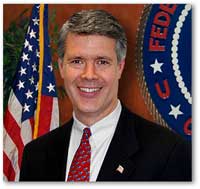
An interesting story in today's
Washington Post about Commissioner McDowell asserting his independence on the Commission, most notably, according to the Post, in his refusal to sign onto the Chairman's "must carry" item.
While this fact may surprise some (including, apparently the
Post editors who viewed the story as worthy of the Business section cover) those of us who know Commissioner McDowell from his years in the telecom industry are not surprised. While we had predicted
here that Chairman Martin would seek to take advantage of having a Republican majority in the early days following his swearing-in, we never predicted that Commissoner McDowell would be a rubber stamp. He has always been independent, fair and thoughtful and we expect that he will continue to be on the Commission.
Another interesting thing in the article is the description of what happened on the
XO Forbearance Petition (see our June 22, post). It appears that the regrettable decision to pull the petition at the last minute was made to avoid putting Commissioner McDowell in a "difficult position." We are sure that Commissioner McDowell could have handled the pressures assoicated with voting on the item, and it would have been nice to see the competitive industry not back down for a change. Maybe the industry will have another chance to prove its mettle soon.

